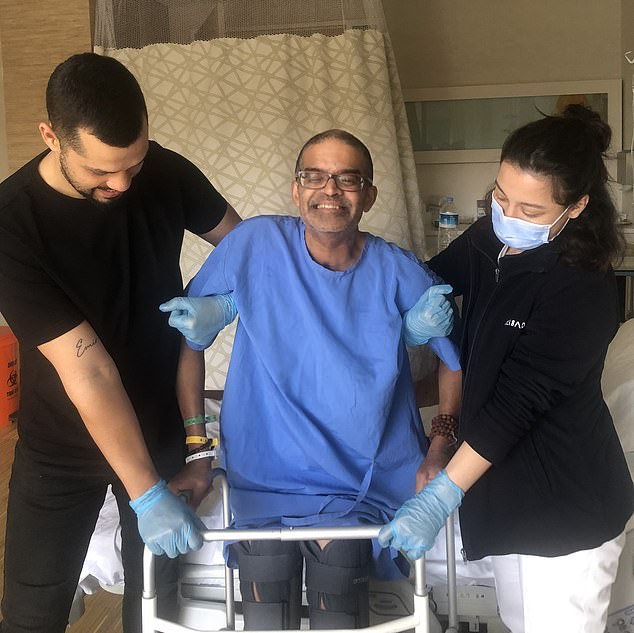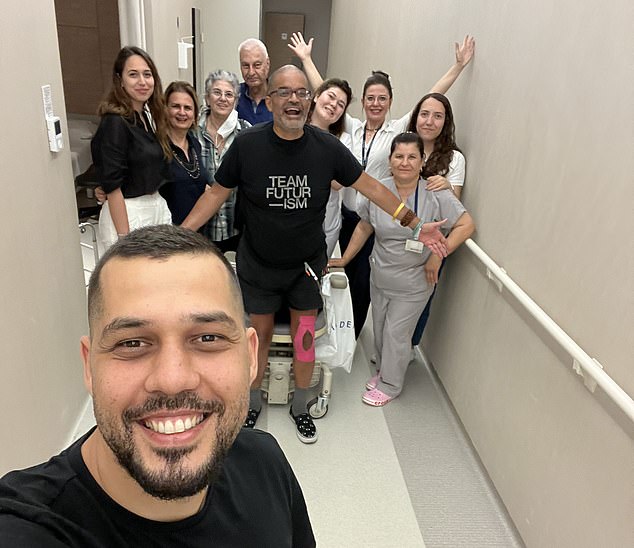Eating from a fancy restaurant in Paris left me paralyzed after contracting listeria, but ‘unique’ treatment in Turkey restored my ability to walk
A man who was left paralyzed after contracting the deadly bacteria listeria from uncooked food has defied the odds and made a miraculous recovery.
Patanjali Chary went from not being able to talk, eat or move to regaining his ability to walk in just three months after being treated at a hospital in Turkey.
While American doctors and leading American medical institutions told Mr. Chary that his recovery could take up to two years, the 53-year-old was released from the Turkish hospital after just three months.
Mr Chary, his wife Jasmin and the medical facility’s care team attribute his unexpected recovery to the innovative technology available at the hospital, as well as the ‘unique’ holistic care he received, including fresh local produce and a ‘feeling of positivity’. , hope and trust’ regarding his health.
Patanjali Chary pictured in a medically induced coma in Benidorm, Spain, as doctors tried to determine what was wrong with him

Mr. Chary (center) after arriving in Bodrum, Turkey. He was very weak and could not get up without help
Mr Chary, who was living in Spain at the time and working on his start-up, visited Paris on business in November 2022, where he was served undercooked food at a restaurant.
He sent the food back to the kitchen, but experienced no immediate discomfort.
But about a month later, on New Year’s Eve, he began to feel ill, but attributed his symptoms to a cold.
The next day he woke up completely paralyzed from the waist down and unable to move.
He was rushed to a hospital in Spain, where doctors were initially unable to determine what was wrong with him. Because he was deteriorating so quickly, they put him in a medically induced coma and put him on life support.
Mr Chary told DailyMail.com: ‘I wanted to get up from bed and everything just gave way. It was shocking.’
It would later be revealed that he had contracted listeria, a potentially fatal bacteria that infected his spine.
Listeria is an infection caused by eating food contaminated with the bacteria Listeria monocytogenes.
Most people who eat food contaminated with listeria do not become seriously ill. But in some cases it can cause confusion and seizures, miscarriage in pregnant women, and even death.
This can happen when the infection spreads beyond the intestines and affects the central nervous system, which can lead to numbness, seizures and paralysis.
Doctors gave him nine different antibiotics in an attempt to treat his condition and a few weeks later he was brought out of the coma.
But enormous damage had already been done. Mr. Chary could not speak or move. His limbs did not function properly and his eyesight was affected.

Mr Chary (middle back) was able to walk again after months of intensive rehabilitation
He was also still paralyzed in both legs.
A feeding tube was inserted into his intestines to deliver nutrients and a tube was placed down his throat to deliver oxygen to his lungs.
In the first attempts to begin his long road to recovery, doctors began passive physical therapy in the hopes that it would help him regain feeling and function in his legs.
In passive physical therapy, a physical therapist moves parts of the patient to initiate the mind-muscle connection, unlike active physical therapy where the person initiates the movement.
When he did not improve, the hospital informed him that he needed more intensive treatment, but the advanced neurological rehabilitation he needed was not available in Spain.
“My wife has searched all over the world,” Mr. Chary said.
A top rehabilitation center in Berlin initially said its caregivers would be able to help him, but two days before he was due to leave, the hospital withdrew via email.
This caused Mr Chary’s wife to panic as doctors had warned them that the longer you waited before treatment, the less chance of recovery.
Shortly after the Berlin plans fell through, Ms Chary discovered a hospital in Bodrum, Turkey, called Acibadem, which offered to help but said there was no guarantee doctors could cure his condition.
When he arrived in Turkey in March 2023, Mr Chary was still unable to move but had begun to talk again and eat a little.
He underwent neurological function tests and more scans, and a comprehensive care plan was initiated.
At this point, his muscles had deteriorated to a great extent from being immobile in a hospital bed for so long.
“I needed four people to lift me,” Mr. Chary said.
He received 24-hour care and began rehabilitation twice a day, including exercises in the hospital bed, practicing standing up and shuffling on his legs.
To help him stand, he was strapped to a bed on a tilting table, which helps stimulate the brain using gravity.
And to try to get Mr. Chary to walk on his own, they used bars for him to hold on to to pull himself up.
Mr Chary also underwent electrical stimulation treatments, which sent signals directly to various nerves in the body.
In addition to all the physical and medical tests that Mr. Chary underwent, he and his wife attributed his rapid and unexpected recovery in part to the holistic approach given to him by the Turkish doctors.
There was a two-word Turkish expression often used by staff members that roughly translated as “Let’s go!” to encourage patients and keep their spirits up.
It became such a common daily mantra that Mr. Chary used it to name two cats he often saw in the hospital cafeteria.
He was given food cooked to suit his recovery, with the right amount of protein and calories, using fresh produce from local markets.
Mr Chary fondly remembers the hospital’s ‘heart first’ approach to his recovery.
‘It was so strange for me to experience that level of care on a daily basis for months… I believe this has played a huge part in why I am recovering at the level I am at now, along with all the other support. ‘ he said.
His friends and family, including some with experience at Harvard Medical School, thought it would take him two years to recover, but Chary left the hospital after just three months.
He was fired in June 2023. Mr. Chary’s care in Turkey cost him $200,000.
Now Mr. Chary continues his therapy at home. He has been out of the hospital for seven months and estimates he is 90 percent back to normal.
Most patients don’t reach this point for 18 months, he was told by doctors.
Mr. Chary is just one of thousands of people who contract listeria every year.
The bacteria are widespread in the environment and can be found in raw food and soil and in the feces of many mammals, birds and fish.
Mild symptoms of the infection include diarrhea and vomiting. These symptoms typically begin within 24 hours of eating contaminated food and usually last one to three days.
However, if the infection spreads beyond the intestines, it becomes an invasive disease, with symptoms appearing within two weeks of eating listeria-contaminated food.
The infection can be treated with antibiotics.
According to the CDC, about 1,600 Americans contract listeria each year and about 260 die.
